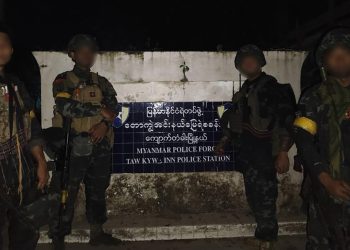Myanmar’s military regime is seeking to adopt a new cybersecurity law to jail anyone accessing banned sites like Facebook via virtual private networks (VPNs).
The regime banned social media following last year’s coup, including Twitter, Instagram and Facebook – the main gateways to the internet in Myanmar – but people access the sites using VPNs, which allow internet users to bypass blocks.
The move to outlaw VPNs is seen as a further attempt to curb digital freedoms, including stifling online fund-raising for resistance groups, internet criticism and the flow of reliable information. Last month the regime doubled mobile internet data taxes.
According to a letter leaked online, the regime’s Ministry of Transport and Communications distributed a revised bill, which it first proposed within a week of the February coup, to 13 other ministries, chambers of commerce, banks, financial services, telecommunications operators and internet service providers and asked for comments by Jan. 28.
The draft law would grant the regime unlimited power to access user data, ban content it dislikes, restrict internet providers and intercept data, and imprison those criticizing the regime online and employees of non-compliant companies.
In the letter, the ministry stated that the decision to enact the law had been made.
An earlier proposal for the cybersecurity law was shelved amid opposition from both domestic and international business groups and IT communities as it would enable the junta to intrude into companies’ internal management.
Rights groups have widely condemned the proposed law as a violation of digital rights, privacy, human rights and freedom of expression.
A former Yangon regional lawmaker from the ousted National League for Democracy, Nay Phone Latt, said the bill is further evidence of the junta’s intent to permanently undermine internet freedom and proof of the success of the anti-regime digital strike.
Sentencing VPN users “would be similar to jailing the whole country”, he said.
“It is totally unacceptable. Only a parliament of elected representatives should have the power to draft legislation. The terrorist regime has no authority to draft laws,” he said. Nay Phone Latt said unless people follow the law, it will just be a written document.
You may also like these stories:
Myanmar’s Most Powerful Ethnic Armed Group Ready to Fight Rival
Junta Insider Wins Myanmar Migrant Contract in Thailand
Myanmar Resistance Raids Two Sagaing Police Outposts

















